The Teal Pumpkin Project: Halloween for Kids with Food Allergies
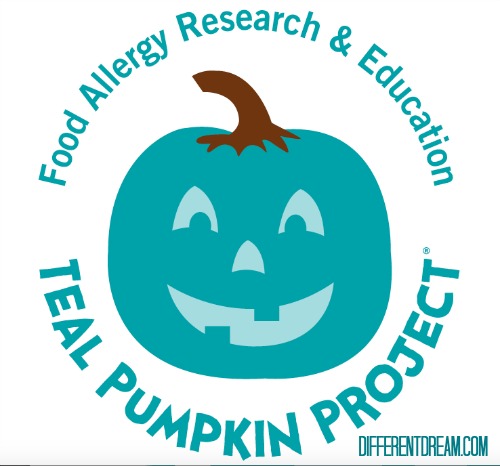
Guest blogger Jill Seaney wants every child to be able to celebrate Halloween. So her guest post explains what the Teal Pumpkin Project is, who it helps, and where to find resources.
The Teal Pumpkin Project: Halloween for Kids with Food Allergies
The Teal Pumpkin Project makes Halloween accessible for the one in every thirteen kids with food allergies. In the average classroom, two children have at least one known food allergy. Kids with food allergies are often left out of the fun because so many of the celebrations are centered around food. As a parent of a three-year-old who suffers from food allergies and cannot eat most food that is considered safe for others, I have invested a lot of time researching and coming up with fun food alternative ideas so that my child never has to feel left out. With Halloween approaching, I thought this was a great time to talk to people about the Food Allergy Research & Education (FARE) Teal Pumpkin Project.
The Teal Pumpkin Project helps make sure all children will come home on Halloween night or from Halloween events with something they can enjoy. Kids who have food allergies typically come home with a basket full of candy that they cannot eat. Its definitely hard explaining to a three-year-old that we have to throw all the candy out because it will make him sick. My hope is that through educating more people about the Teal Pumpkin Project, more people will offer non-food items and display a teal pumpkin so that all kids get to enjoy Halloween. Every child should be able to experience the joy and tradition of trick-or-treating!
Fortunately, FARE started the Teal Pumpkin Project to make it simple for everyone to help make Halloween special for kids that have food allergies.. All you need to do is paint one of your pumpkins teal, or buy a teal pumpkin (many craft stores sell plastic or ceramic teal pumpkins, too), and display it with your other pumpkins outside your home and then offer non-food treats. There are also signs that you can download and print from the FARE website that you can hang on your door or outside your home to let trick-or-treaters know that you support the Teal Pumpkin Project and have non-food treats to hand out. The link is included below. But remember, the best way to raise awareness is to have the teal pumpkin outside your home.
Remember to keep non-food treats in a separate bowl from the candy bowl to avoid cross contamination. How will you know which trick-or-treater has a food allergy and which doesn’t?
It’s as simple as asking, “Would you like a piece of candy, or would you like a prize?” Most children know that they have food allergies and will be so excited to go to a house and find something they can enjoy.
There are a lot of alternative treats to candy. Some examples are:
- Stickers
- Glow sticks, bracelets, necklaces
- Bubbles
- Mini Slinky
- Bouncy balls
- Finger puppets
- Crayons, pencils, pens
- Coins
- Mini notepads
- Mini flashlights
- Whistles
The goal of the Teal Pumpkin Project is to help children like mine feel included in the fun of Halloween. I hope you will consider joining the movement as well and help all children have a very happy Halloween this year.
For more information on the Teal Pumpkin Project, please visit their website.
The Teal Pumpkin Project home sign can be downloaded here.
Do you like what you see at DifferentDream.com? You can receive more great content by subscribing to the quarterly Different Dream newsletter and signing up for the daily RSS feed delivered to your email inbox. You can sign up for the first in the pop up box and the second at the bottom of this page.
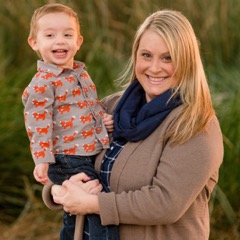
By Jill Seaney
Jill lives in Tucson, AZ with her husband Jeff and their son Blake. She worked in Human Resources up until 2014 when her son was born with VACTERL Syndrome which included EA/TEF. Jill resigned to care for her son full time. Later he was also diagnosed with a Congenital Diaphragmatic Hernia and Eosinophilic Esophagitis. Jill’s personal blog (Beloved Blake) documents his surgeries and health challenges, their family struggles, and Blake’s milestones. Jill loves writing and teaching others about what it’s like raising a child with complex medical needs. She wants to be a blessing to other parents just starting on this journey.
2 Comments
Submit a Comment
Subscribe for Updates from Jolene
Related Posts
Resources for Caregiving Parents Recommended by Caregiving Parents
The Sharing Love Abundantly blog series wraps up with a look at the caregiver-recommended resource section at the end of the book.
The Holiday Season Can Be Hard for Caregiving Families
The holiday season can be hard for caregiving families. They can become a little less difficult by looking for pockets of joy.
Wisdom from Caregiving Parents about the Love Languages and More
The final chapter of Sharing Love Abundantly is full of wisdom from caregiving parents. Here are a few nuggets to whet your appetite.



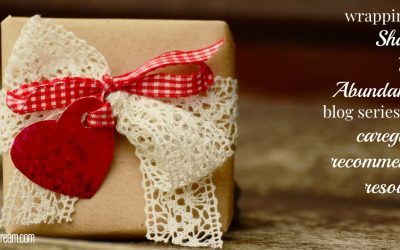
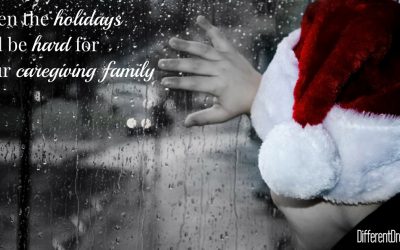
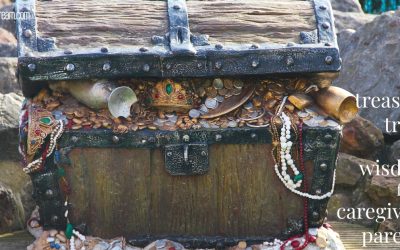
That’s a really good question, but I have no idea!
And are there any teal fidget spinners this year?